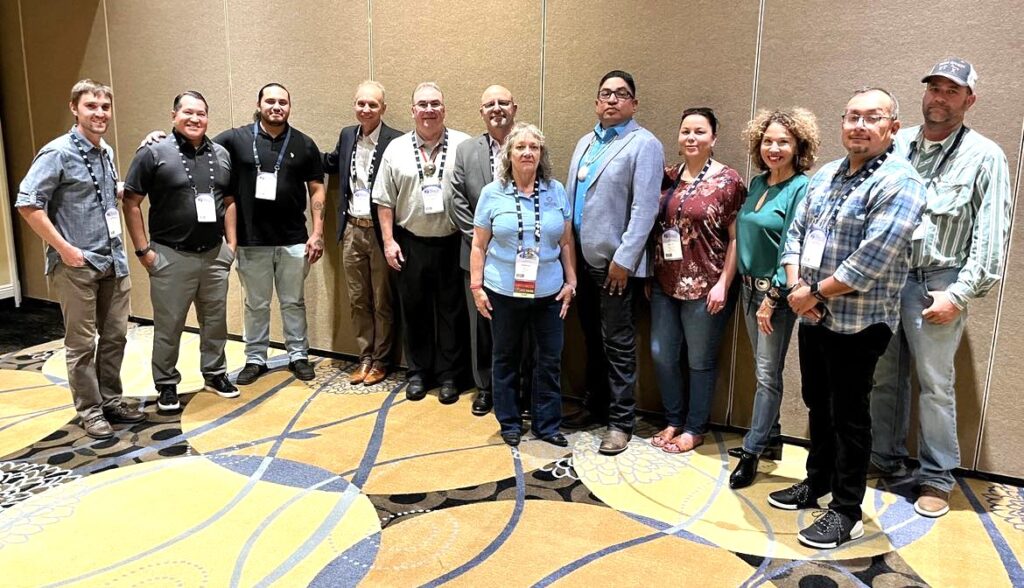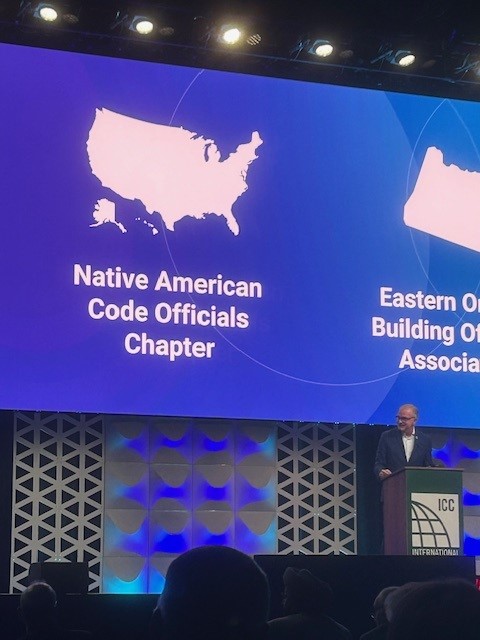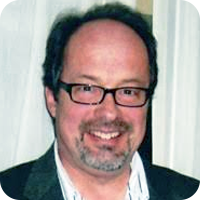
Establishment of NACO as the First Sovereign Chapter of the International Code Council
The Board introduced and approved a new category of Code Council chapters, known as Sovereign Chapters, and NACO now stands as the first Sovereign Chapter.
On October 19, 2024, at the International Code Council Board of Directors meeting in Long Beach, California, the Board approved the establishment of the Native American Code Officials (NACO) as the first Code Council chapter dedicated specifically to Native code officials. Construction requirements and approaches differ significantly among the 674 federally recognized tribes and over 100 state-recognized tribes across the U.S. This historic decision by the board is a major step toward supporting housing and construction activities on Native lands and prompted a standing ovation in the room.
Immediately prior to this action, the Board introduced and approved a new category of Code Council chapters, known as Sovereign Chapters, and NACO now stands as the first Sovereign Chapter.
“This historic vote marks a transformative moment for the Code Council and for Native American communities. By establishing the Sovereign Chapter category and welcoming NACO as the first of its kind, we take a significant step toward supporting housing and construction efforts on Native lands,” said David Spencer, President of the Code Council Board of Directors.
“That was huge,” said David Jackson, President of the NACO Board of Directors. “We will create a sense of community for Native American nations within the building safety world. The challenge in front of us is so new, and our growth depends on listening closely. We need to hear about the experiences, challenges and solutions to help our jurisdictions grow. These are sovereign nations each with their own histories, their own cultures and customs, their own experiences and philosophies. I see NACO as kind of a melting pot of these ideas.”

Jackson is a building code official on his home reservation, the Gila River Indian Community near Phoenix, Arizona. His own career path started when he finished his duty as a U.S. Marine and found an apprenticeship opportunity. There, he found a mentor in his boss, Fernando Luna.
“It was in my first year when I got an email from Fernando with a photo he took that day from an inspection,” Jackson said. “He asked what I thought was out of order. That sent me pouring through my code books, eager to find the problem. He took a moment to challenge me, and that made all the difference.”
A New Era for Safe Housing on Tribal Lands
News of the Code Council Board’s action struck Tawney Brunsch as the completion of an uphill effort to formalize the chapter and the beginning of the hard work of getting codes adopted and enforced in Indian Country. As executive director of the nonprofit Lakota Funds, Brunsch has worked for years to help Native families build and buy much-needed quality housing on the reservations in South Dakota.
The key to safe and dependable housing, she realized, would be the use of the International Codes® (I-Codes). The primary roadblock, however, has been the absence of building codes on any of the state’s nine reservations. That’s why, a few years ago, she made establishing a Code Council chapter for Native building safety code officials a formal priority for Lakota Funds and the South Dakota Native Homeownership Coalition (SDNHOC). Today, she is a member of NACO’s five-member board of directors.
“A chapter made up of Native code officials, including those working in non-Native lands, would be a resource for educating elected tribal officials on the value of adopting and enforcing model building safety codes,” Brunsch said. “The adopted codes would empower community leaders to make sure residential and commercial structures are safe, dependable and resilient.”
Lakota Funds is a partner of SDNHOC, a collaborative group representing tribes, government agencies, housing entities, nonprofits, housing developers and lenders. Their goal for home ownership on tribal lands is designed to encourage economic growth and to create generational wealth. Brunsch said saddling these new home buyers with defective housing could bankrupt them.
“For the Coalition, we see how that can be devastating for a Native family who already is dealing with land barriers, securing loans and financing and finding dependable contractors,” Brunsch said. “Buying a home and being able to afford to stay in it becomes a struggle, especially if there’s faulty wiring, poor insulation, flooding and shifting basements. People can’t afford to have these things redone on top of making payments.”
Paving the Way for Code Certifications on Tribal Lands
Lakota Funds’ strategy has been to work with tribal housing agencies to recruit tribal members to obtain training on the International Residential Code® (IRC)and related codes to create a workforce with code certifications on each reservation.
Instrumental to that strategy is Ellen White Thunder, a member of the Oglala Sioux Tribe on the Pine Ridge Reservation and NACO’s secretary-treasurer. White Thunder has a master’s degree in construction engineering and management from the S.D. School of Mines & Technology. She explained that her experience teaching college courses gave her an advantage in creating an effective learning environment for Native learners participating in training and online testing. Online testing, she noted, has been particularly challenging due to what she described as the “digital divide” impacting residents on reservations.
With support from an Economic Development Administration grant, White Thunder has been ramping up the training schedule. She reduced class sizes and brought in David Jackson, along with other Code Council Preferred Providers, as trainers.
“It changes the chemistry in the room when David is training,” she said. “He is effective because he comes from Indian Country, and he has experiences and understands the challenges they identify with. It makes it more comfortable for learners knowing that the Code Council instructors understand their experiences without the dread of feeling like their communities are being judged.”
She also took the training and passed the online tests to receive certifications in the IRC, the International Plumbing Code®, the International Mechanical Code®, the International Property Maintenance Code® and the International Energy Conservation Code® and to gain more insight to improve success rates for certifications. White Thunder notes that the effort has created progress in the last few years.
“Six of the nine tribal jurisdictions in South Dakota now have certified residential inspectors on them. When I started there was only one and that was David Spider at the Sisseton-Wahpeton Oyate,” she said. “I’m frustrated because there should be nine out of nine. Everyone deserves to have their investments protected by building safety codes.”
She said NACO would be helpful in making the adoption and enforcement of building safety codes a high priority with tribal governments. By attending the last few of the Code Council’s Annual Conferences, she said she realized that the Code Council would also benefit from the input from Indian Country in its governance and in building code development.
Advancing Native Sovereignty Through Building Codes
That view is shared by NACO Vice President Daniel A. Burr, a member of the Stockbridge-Munsee Band of the Mohican Indians and a Minnesota building/fire codes consultant. His 23-year code career started as a building inspector intern in 2001, for the Shakopee Mdewakanton Sioux Community in Prior Lake, Minnesota, where he became a building inspector and fire inspector working for many years. Burr is a certified Minnesota State Building Official and National Fire Protection Association Fire Inspector with code experience working for tribal governments, city governments and the federal government.
He also worked for a Native American third-party inspection agency in which he is proud of being chosen to be a Native American Senior Building Official and to build a team of code inspectors to establish code compliance in plan review and building inspections for very large-scale Google Data Center Construction Projects. Burr then started his own Native American Building/Fire Code Consulting business, Fire Safe Build Consultants, LLC, which works with tribal nations with their code issues.
Burr said that in his work around the nation, he would have a hard time finding other Native Americans who serve as code officials or inspectors. But when he did find one, he said he would be reminded that there ought to be some kind of national network to share issues, seek professional advice and work on solutions. Eventually, he met Code Council staff at an energy codes meeting in Chicago, which led to a meeting with David Jackson.
“I got a call from David, and we must have talked on the phone for hours, about starting a Native American code officials’ chapter. I discovered that we both shared the same visions for Indian County, which is to offer the same protections to Native Nations and improve their economies, better substandard housing and strengthen their sovereignty through tribal building codes.”
He said NACO speaks to traditional values held by generations of Native Americans by putting an emphasis on survival of communities and generating opportunities for young people. Chicago’s Matthew Beaudet agrees. He met David Jackson at the Code Council’s Annual Conference in Pittsburgh and was excited to create a building code officials group aimed at strengthening the sovereignty and empowerment of Native jurisdictions.
“David is pure energy. He’s just what Indian Country needs,” Beaudet, a member of the NACO board and former Chicago Building Commissioner, said. “He’s hungry to help people do better in life. That takes a lot of determination. He’s not in it for himself.”
Leadership in Building Codes and Native Advocacy
Beaudet’s career road started humbly as one of six kids raised in a one-bedroom Chicago home. Later, his father signed up as an apprentice electrician which provided a living wage and built the stairway to his children’s success. Beaudet remains close to his Native roots, which were imbedded on Long Island before it became famously known as The Hamptons.
“I’m an enrolled citizen of the Montaukett Indian Nation. My mom was Montaukett and Matinecock. My dad was Penobscot, present-day Maine, and Weskarini, present-day Ontario. All four tribes are Woodland Algonquin Peoples,” he said.
Matthew Beaudet’s path has included an impressive educational journey through Loyola University Chicago, the University of Illinois Chicago School of Law, the University of the Pacific – McGeorge School of Law, Paris Lodron Universität Salzburg, and the University of Oxford. Early in his law career, he gained the attention of political leaders and established a reputation as a reliable problem solver.
Notably, he has served as:
- Chief of electronic tolling for the Illinois Tollway where he managed a $400 million budget for a two-year major reform of all 20 mainline toll plazas and 121 toll ramps of the 274-mile Interstate toll road system.
- Deputy Health Commissioner where he reorganized and managed the day-to-day operations of the nation’s third-largest local public health department, consisting of 30 public health programs, 19 clinics, 1,000 employees, 200 delegate agencies and a $200 million budget. He managed the distribution of 1 million vaccines to combat the 2009 H1N1 Flu pandemic.
- Deputy building commissioner and later as Building Commissioner to the City of Chicago where he managed the day-to-day operations of the nation’s third largest local buildings department of 290 employees and a $40.1 million budget that issues 40,000 building permits, conducts 160,000 inspections, and regulates 30,000 trade licensees annually.
Throughout his career, Beaudet maintained a personal dedication to the betterment of Native people in Illinois and beyond, starting with 24 years of pro bono work for his home Montaukett Indian Nation and as founder and first president of the Illinois Native American Bar Association. Now, his passion is focused on NACO, inspired by its mission and the dedication of its board members and the Code Council Board of Directors. “NACO believes that the I-Codes will promote tribal sovereignty, tribal health and safety, and tribal economic empowerment,” said Beaudet.
“I’m just happy that on the tail end of my journey that I can pass along any experience or insight to David’s generation and beyond so that they may take off with it,” said Beaudet.

Interested in starting a Code Council Chapter? Click here to learn more.







